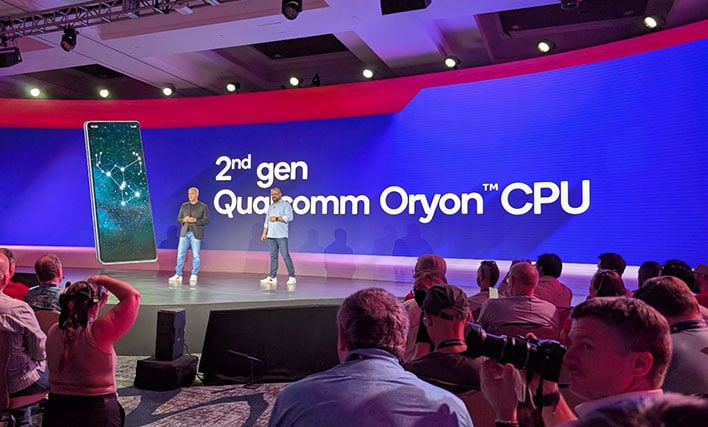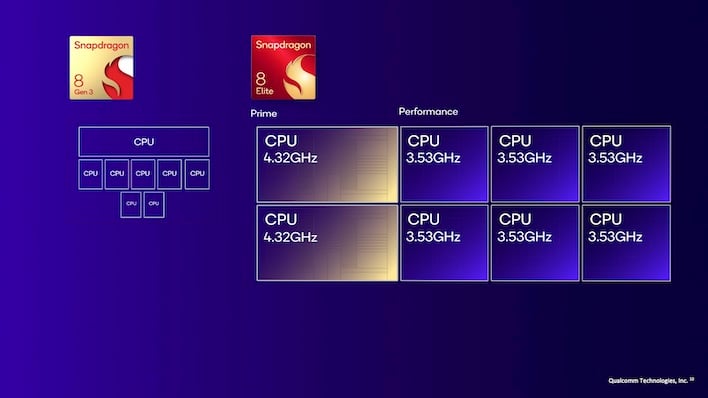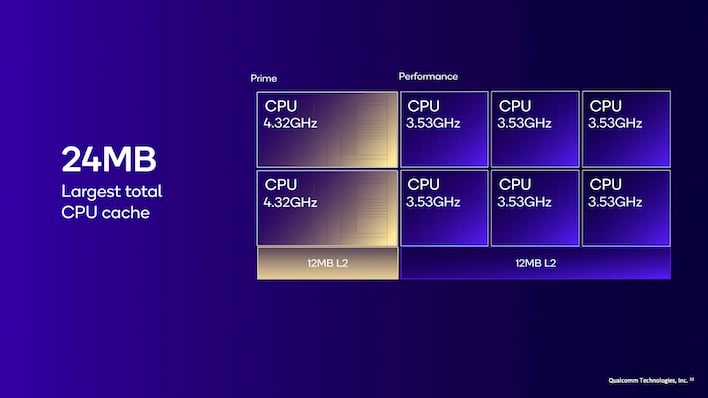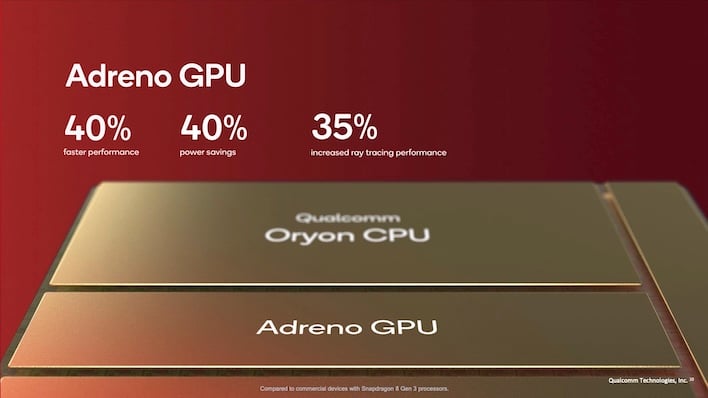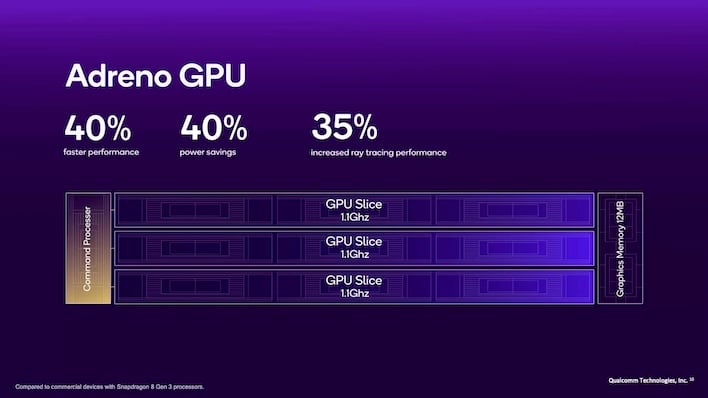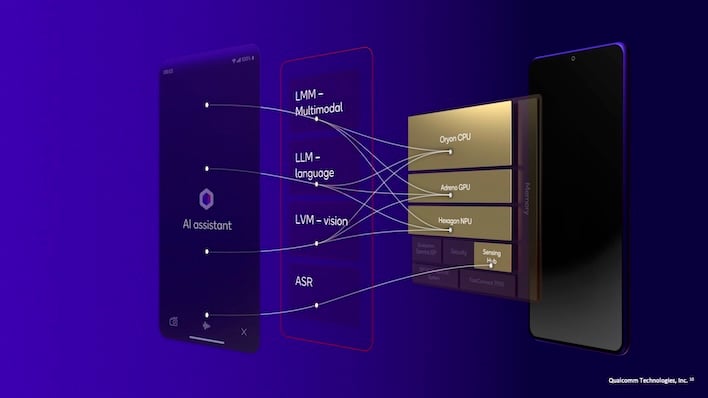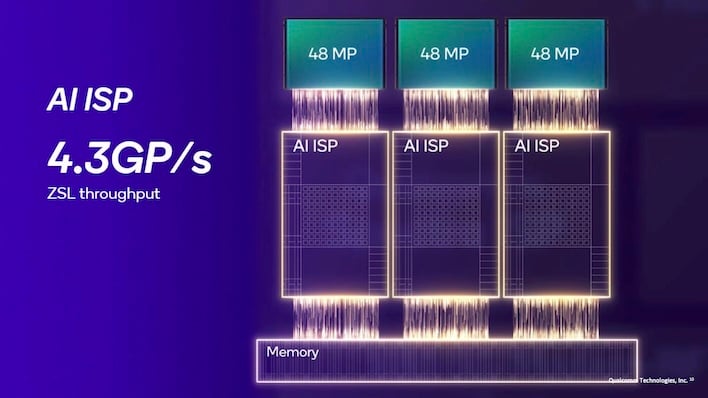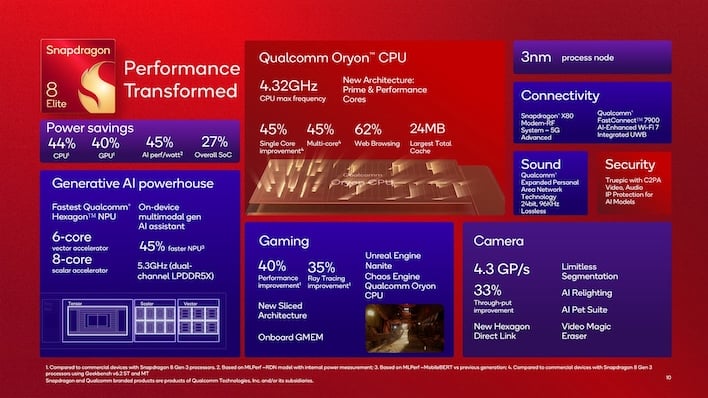Qualcomm’s Snapdragon 8 Elite Turbocharges AI, Gaming And Photography For Phones
See The New Snapdragon 8 Elite In Action, Live From Snadragon Summit '24
Snapdragon 8 Elite: Oryon In the Palm of Your Hand
The Snapdragon 8 Elite marks the Oryon CPU architecture's first entry into smartphones. If you recall, the Oryon CPU architecture debuted in the Snapdragon X Elite/Plus, which powered the initial wave Copilot+ enabled Windows PC. The Snapdragon 8 Elite, however, features an updated 2nd Generation Oryon architecture, enhanced and tooled specifically for smartphone applications. The 2nd Generation Oryon architecture features a larger L1 cache (how much larger wasn't specified), an enhanced prefetcher, and new L2 cache heirarchy.Much like Apple has done in the transition from its M4 in the iPad Pro to the A18 Pro in the iPhone 16 Pro, Qualcomm is migrating its top performance architecture to the most ubiquitious computing devices we have--our smartphones. That's good news, because Oryon is a big step up over previous generation CPUs from the company in terms of features, efficiency, and performance.
Last year's Snapdragon 8 Gen 3 had a pretty complex design. It came with a single "prime" core, which was a Cortex X4, multiple speed grades of different Cortex A720 cores, and finally a pair of Cortex A520 efficiency cores. The Snapdragon 8 Elite eschews that complexity in favor of a pair of Oryon prime cores clocked at up to 4.32GHz and six performance CPU cores clocked at a maximum of 3.53GHz.
The fastest pair, dubbed the Prime cores, share 12MB of L2 cache, while the other six Performance cores share their own 12MB as well. All of that portable CPU horsepower is built on TSMC's 3nm process and is tied to 5.3GT/sec LPDDR5x memory. Qualcomm says that the combination of its latest CPU architecture, advanced process technology, and fast memory elevates the Snapdragon 8 Elite's performance and efficiency by 45% each, and as a result lowers total power consumption to the tune of 27%. That translates to additional battery power for games, web browsing, and other smartphone-specific tasks, with smoother more responsive performance.
These benchmarks below are provided by Qualcomm, but should give a peek at performance. As always it's important to temper excitement until we see retail devices running these chips. That shouldn't be too long off, but for now, let's see what we should expect from the latest Snapdragon chip in terms of CPU performance:
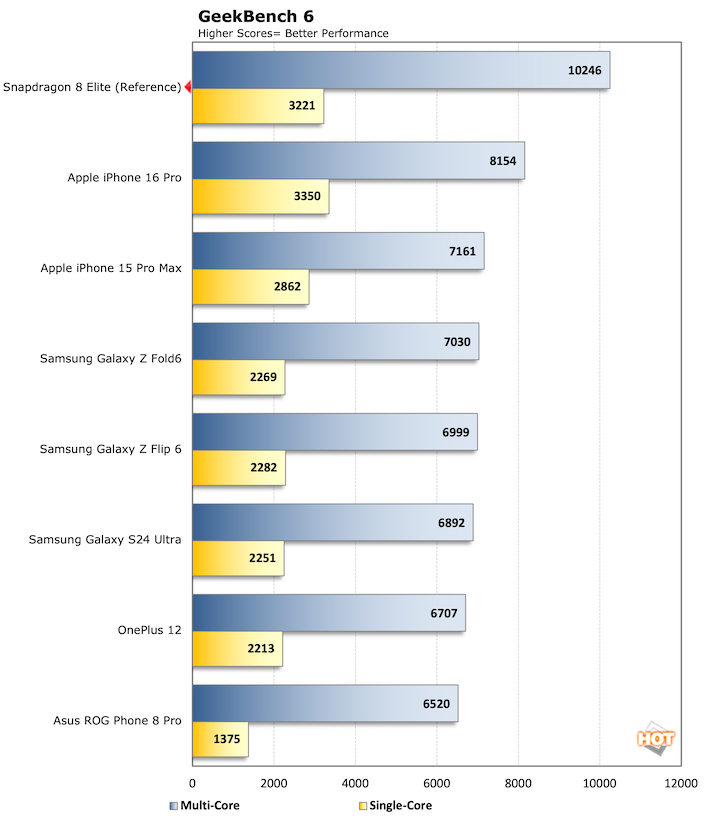
Our first couple of experiences with Windows Copilot+ PCs featuring Snapdragon X Elite processors were pretty positive. For example, the HP Elitebook Ultra G1q ran competitively against x86 laptops with higher-TDP CPUs, and that's on a platform that's dominated by a completely different CPU architecture in x86-64. Making the jump to smartphones puts Qualcomm in its "home turf", so to speak, of Android, where Oryon could really shine.
Snapdragon 8 Elite Adreno Graphics Improvements
The Adreno family of mobile GPUs already stymied the Apple-fueled competition when we looked at the iPhone 16 Pro, and Snapdragon 8 Elite promises to expand that gap. Qualcomm says mobile gamers can expect a 40% increase in GPU performance. Power consumption shouldn't increase, either, as it has also be reduced by 40%. In addition to that, ray tracing performance is up 35%, as well.The new Adreno graphics architecture brings with it a "sliced" design in which the GPU only has to activate as much of the silicon as is necessary to render the scene on the device's display. The Command Processor receives graphics instructions and decides how many slices of GPU to power up and put to work. Those slices share their own dedicated 12MB cache, which gives the GPU a pool to work with that doesn't require hitting the shared memory bus, granting increased performance without sapping as much from other areas of the chip.
To show off those enhanced graphics, Qualcomm and Feral Interactive demoed GRID Legends running on an Android smartphone. The game uses Adaptive Performance Engine 4.0, Qualcomm's own automatic scaling technology, to keep everything running smoothly no matter the resolution and frame rate. Epic Games' Nanite demo for Unreal Engine 5 was also shown on a device, complete with virtualized geometry.
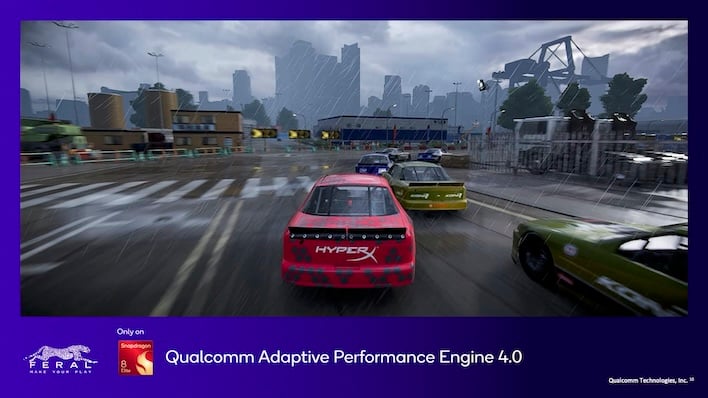
And just like the CPU, Qualcomm has provided some benchmarks for guidance. Again, we should wait to see what retail devices do with our benchmark suite, but it does look like there will be some sizable performance benefits from the Snapdragon 8 Elite in mobile games.
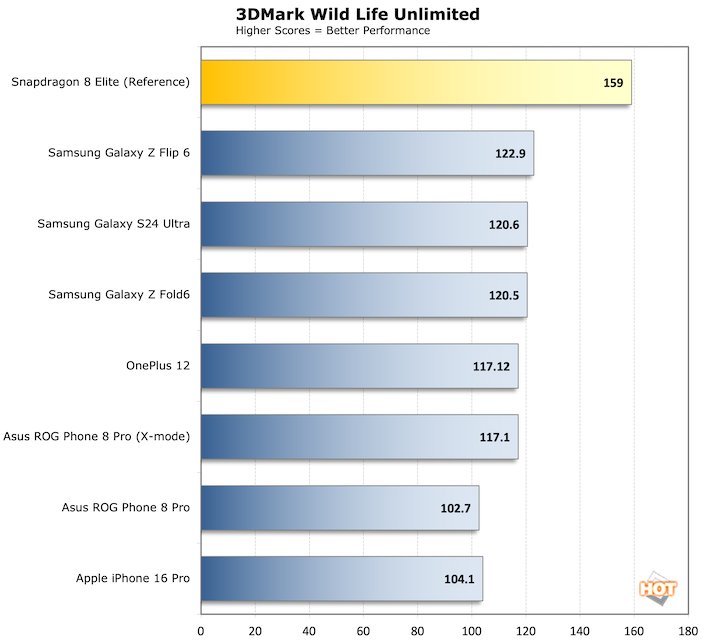
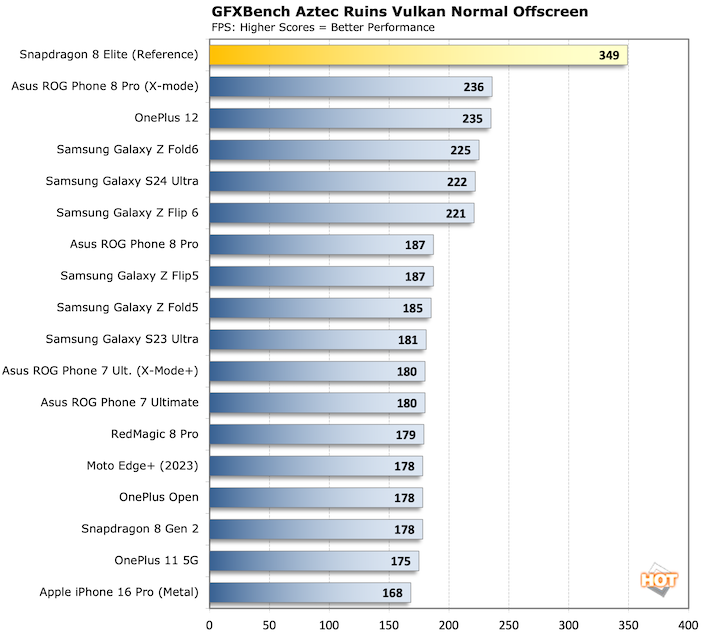
At least according to Qualcomm's internal benchmarks, the Snapdragon 8 Elite absolutely smokes everything that's come before it in both 3DMark Wildlife Extreme's off-screen test as well as GFXBench Aztec Ruins with Vulkan. That makes running GRID Legends seem much more realistic, and we're eager to see it in action on the small screen for ourselves.
Snapdragon 8 Elite: Huge AI Performance Uplift
Of course, AI is a huge deal for any chipmaker these days, and smartphones need to deliver on-the-fly performance without killing battery life. To that end, Qualcomm says to expect up to 45% better performance and (sticking to the symmetrical theme of the announcement) an equally large 45% improvement in performance per watt.First of all, because of Oryon's improved floating-point and integer performance, the Snapdragon 8 Elite's CPU cores can deliver much faster first-inference latency without hitting the Hexagon NPU and without using the GPU for AI calculations. Much like a modern PC, the Snapdragon 8 Elite leverages multiple engines to allow for AI multi-tasking. AI assistants may need large language models, multi-modal processing, computer vision, and automatic speech recognition to run simultaneously, and the different AI engines of the latest chip should allow new workloads to run wherever other tasks aren't already running.
Snapdragon 8 Elite Signal Processing: Camera, Wireless Networking, and More
The best camera is the one you have with you, and modern smartphones have a lot of cameras. It's for that reason that Qualcomm has bumped up its AI image signal processor (ISP) to handle 4.3 Gigapixels per second of image throughput. That's enough to handle, for example, a trio of 48MP sensors feeding full-resolution images at 30 fps.The AI part of the AI ISP allows for "limitless" segmentation of images, distinctly recognizing different objects and separating them from one another so that they can be processed individually. That allows for multi-exposure images that capture just the right amount of light on each object. The AI ISP also features real-time skin tone and sky recognition to ensure proper exposure and focus, as well.
Integrated into the Snapdragon 8 Elite is the new X80 5G modem, which Qualcomm says is the first AI-based multi-antenna management system in the world. It has six receiver paths that can handle 6x carrier aggregation, and it's ready for 5G-Advanced communication technologies. The Snapdragon 8 Elite also has Qualcomm's Sense Hub for discrete sensor handling, and integrates Wi-Fi 7 for fast wireless local networks.
Snapdragon 8 Elite Smartphones Coming to a Carrier Near You
Snapdragon 8 Elite phones are, like their predecessors, going to be just about everywhere. The company says that in the coming weeks, we'll see releases from ASUS, OnePlus, OPPO, Samsung, and many more. We're definitely eager to get our hands on the first Snapdragon 8 Elite phones to see how they handle and how long they last on battery. Stay tuned to HotHardware for the latest announcements, and for reviews once we can get devices into our possession.

